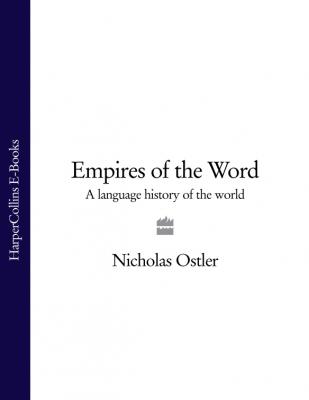Empires of the Word: A Language History of the World. Nicholas Ostler
Читать онлайн.| Название | Empires of the Word: A Language History of the World |
|---|---|
| Автор произведения | Nicholas Ostler |
| Жанр | Зарубежная образовательная литература |
| Серия | |
| Издательство | Зарубежная образовательная литература |
| Год выпуска | 0 |
| isbn | 9780007364893 |
PROLOGUE: A CLASH OF LANGUAGES
PART I THE NATURE OF LANGUAGE HISTORY
2 What It Takes to Be a World Language; or, You Never Can Tell
3 The Desert Blooms: Language Innovation in the Middle East
4 Triumphs of Fertility: Egyptian and Chinese
5 Charming Like a Creeper: The Cultured Career of Sanskrit
6 Three Thousand Years of Solipsism: The Adventures of Greek
7 Contesting Europe: Celt, Roman, German and Slav
10 Usurpers of Greatness: Spanish in the New World
11 In the Train of Empire: Europe’s Languages Abroad
12 Microcosm or Distorting Mirror? The Career of English
Part IV Languages Today and Tomorrow
PROLOGUE: A CLASH OF LANGUAGES
On 8 November 1519 Hernán Cortés and a band of three hundred Spaniards met for the first time the supreme ruler of Mexico. The venue was the causeway across the lake leading to its capital city, Tenochtitlán. All around them was water. On the eastern horizon a volcano could be seen in eruption. Cortés was on horseback, bearded, in shining armour, belying his recent career as a small-town law officer and amateur gold prospector. Motecuhzoma,* born to sit on the royal mat of Mexico and already victorious in many wars, was carried on a litter, resplendent in a vast circular headdress with plumes of lustrous green quetzal, ornaments on his nose, ears and lower lip, behind him an escort of warriors wearing jaguar hides and eagle feathers.
After an exchange of gifts, the Spaniards were led into the city, and accommodated in a palace that had been the residence of Motecuhzoma’s father. They were given a dinner of turkey, fruit and maize tamales. Then Motecuhzoma, whose official title was tlatoani, ‘speaker’, returned to greet his guests.
This was the first moment when the two leaders shared directly with each other their understanding of this epoch-making encounter: the ruler of the largest empire in the Americas, still at the height of his power, coming face to face with the self-appointed emissary of the king of Spain, who, though under guard in a well-kept and well-ordered city, larger than any to be seen in Europe, was yet strangely unawed. Their words set the tone for all that was to follow, above all the tragic diplomacy and incomprehension of the Aztecs, and the calculating, dissembling, but unremitting, aggression of the Spaniards. It was the first step towards the replacement of Nahuatl as the imperial language of Mexico, and the progress of Spanish towards its establishment as the language first of government and religion and then of everything else in the New World.1
Motecuhzoma opened with a flowery speech in Nahuatl, translated by the interpreters whom Cortés had brought with him: Malin-tzin, a Mexican noblewoman, rendered the Nahuatl into Yucatec Maya, and Fray Géronimo de Aguilar, a Spanish priest, conveyed the sense of the Maya into Spanish. Cortés then replied in Spanish, and the process ran in reverse.
Totēukyoe, ōtikmihiyōwiltih ōtikmoziyawiltih.*
Our Lord, how you must have suffered, how fatigued you must be.
This was a conventional greeting, although there would have been few whom the tlatoani of all Mexico would address as tēukyoe, ‘Lordship’.
You have graciously come on earth, you have approached your water, your high place of Mexico, you have come down to your mat, your throne, which I have briefly kept for you, I who used to keep it for you.
This was already strange. Motecuhzoma was addressing Cortés as a steward to his sovereign. ‘For they have gone, your governors, the kings, Itzcoatl, the old Motecuhzoma, Axayacatl, Tizoc, Ahuitzotl, who hitherto have come to be guardians of your domain, to govern the water, the high place of Mexico, they behind whom, following whom your subjects have advanced.’†
This was really bizarre. Motecuhzoma seemed to place Cortés as a long-lost, supreme king of this very land. ‘Do they still haunt what they have left, what is behind them? If only one of them could see and admire what has happened to me today, what I now see in the absence of our lords, unbeknown to them. It is not just a fantasy, just a dream; I am not dreaming, not fantasising;
for I have seen you, I have looked upon you.’* Now he was claiming to have had a vision of some kind. Cortés must already have been thinking that chance, or God, was delivering the Mexican leader into his power. ‘For I have long (for five days, for ten days) been anxious to look far away to the mysterious place whence you are come, in the clouds, in the mists. So this is the fulfilment of what kings have said, that you would graciously return to your water, your high place, that you would return to sit upon your mat and your throne, that you would come.’
